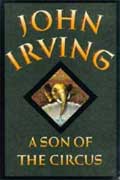 This book review was originally published in the Baltimore Evening Sun on October 3, 1994.
This book review was originally published in the Baltimore Evening Sun on October 3, 1994.
Dr. Farrokh Daruwalla is a perpetual foreigner. He feels at home in neither his native India nor his adopted homeland Canada, and he identifies with neither his daytime profession as an orthopedic surgeon nor his nighttime career as a screenwriter. Like the highwire circus artists he so admires, Daruwalla’s life is a continual balancing act between conflicting loyalties.
In some ways Daruwalla resembles his creator, John Irving, in whose eighth novel A Son of the Circus he is the main character. Irving, like Daruwalla, has a penchant for straddling fences; he’s a popular novelist with highbrow pretensions as well as an old-fashioned storyteller with very modern concerns.
A Son of the Circus definitely qualifies as one of Irving’s oddest creations, but for most of the way it’s among his most satisfying. Like most Irving novels, it’s a sprawling book that swoops around the globe and through multiple generations of history. And it includes a grab bag of typical Irving topics: perverse sexuality, Christianity, unusual families, and untimely death.
On the surface, A Son of the Circus is a murder mystery revolving around several members of the posh Indian Duckworth Club, Dr. Daruwalla’s social hangout of choice. Police find on the corpse of one victim a note promising more deaths if John Dhar, Dr. Daruwalla’s sort-of-adopted son, doesn’t withdraw his membership to the club.
Death threats are nothing new to Dhar, a celebrity thriller actor in India whose films have at one time offended all castes and religions on the subcontinent. Since it was Farrokh Daruwalla who anonymously created Dhar’s infamous screen identity and inspired such public vilification towards him, it’s the doctor who must come to Dhar’s assistance.
At first it seems like the murderer must be one of the hijra, a mysterious “third gender” of Indian eunuchs who took offense at the latest Inspector Dhar film. With the help of Inspector Vijay Patel, however, they discover that Lal’s death is only one in a series of rapes and mutilations that have been going on for the past twenty years. Heretofore all Patel knew about the killer was the bizarre signature drawing of a winking elephant left on the victims’ bellies.
Things are only complicated by the sudden reappearance of Dhar’s identical twin Martin Mills, separated from his brother at birth by their irresponsible actress mother. Unfortunately Mills, a zealous Christian missionary who doesn’t even know of his twin brother’s existence, unsuspectingly chooses the date of release of Dhar’s newest movie to pop up in India.
Despite the elaborate whodunnit plotline, A Son of the Circus really has no ambition of being a mystery novel. Circus instead concentrates on the richly detailed family history of Daruwalla and Dhar with a dizzyingly large cast of characters interconnected in surprising and often hilarious ways. Most importantly, they’re all linked by their search for a purpose.
When Irving is parading around his colorful troop of characters, A Son of the Circus is captivating fun. About two-thirds of the way through the novel, however, the meandering flashbacks and diversions come to a halt and the magic ebbs out of the novel like the air from a pierced balloon. When you finally set the novel down, you’re left with the same numbing question that many Irving novels leave you with: What was that all about?
Irving’s main message in A Son of the Circus seems to be this: the only time we don’t feel like foreigners in life is when we pretend that we have some control over its outcome.